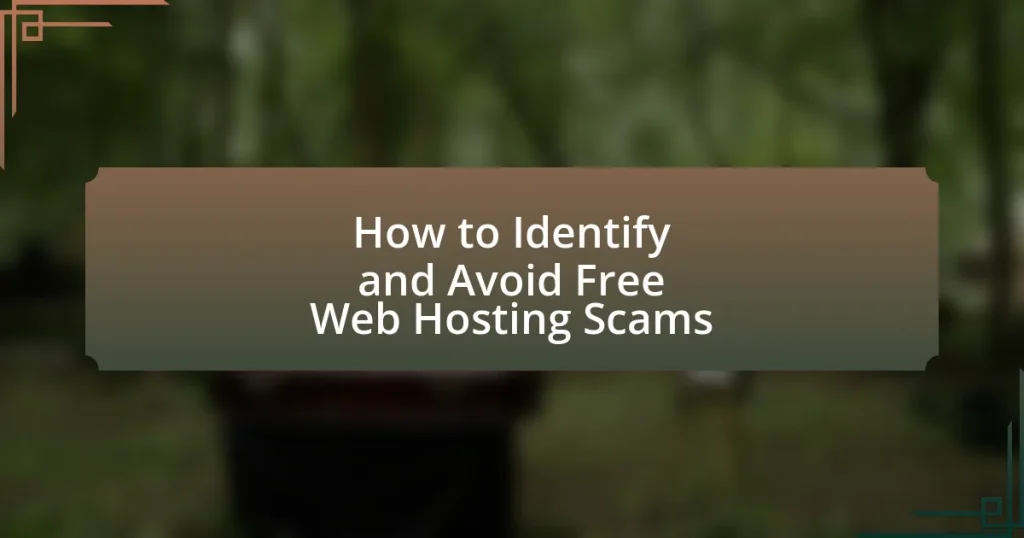Free web hosting scams are deceptive services that promise no-cost website hosting but often result in poor performance, hidden fees, and potential data theft. These scams attract users with unrealistic offers, exploiting vulnerabilities in trust and using tactics such as urgency and social proof. Key indicators of these scams include unrealistic promises, lack of transparency, and poor customer support. Users can protect themselves by recognizing red flags, conducting thorough research, and understanding the terms of service. The article provides insights into identifying these scams, the reasons people fall for them, and best practices for selecting legitimate web hosting services.

What are Free Web Hosting Scams?
Free web hosting scams are fraudulent services that promise free website hosting but often deliver subpar performance, hidden fees, or data theft. These scams typically lure users with attractive offers, such as unlimited storage or bandwidth, but may impose restrictions that compromise website functionality. According to a report by the Better Business Bureau, many users have reported issues such as unexpected charges, poor customer support, and loss of data, highlighting the risks associated with these deceptive services.
How do free web hosting scams operate?
Free web hosting scams operate by enticing users with the promise of no-cost services while often hiding ulterior motives such as data theft, malware distribution, or upselling of premium services. These scams typically lure individuals with attractive offers, but once users sign up, they may face hidden fees, poor service quality, or their personal information being sold to third parties. Research indicates that many of these scams exploit vulnerabilities in user trust, leveraging social engineering tactics to manipulate potential victims into providing sensitive information or making unnecessary purchases.
What tactics do scammers use to attract users?
Scammers use tactics such as offering unrealistic promises, creating urgency, and leveraging social proof to attract users. These tactics are designed to manipulate emotions and create a sense of trust. For instance, scammers often promise free services with no hidden fees, which can lure users into a false sense of security. Additionally, they may create a sense of urgency by claiming limited-time offers, prompting users to act quickly without thorough consideration. Social proof is also utilized, where scammers showcase fake testimonials or endorsements to build credibility. According to the Federal Trade Commission, these strategies are common in various scams, highlighting the importance of vigilance when evaluating offers.
How can users recognize red flags in these scams?
Users can recognize red flags in free web hosting scams by identifying several key warning signs. First, if a hosting service promises unrealistic features, such as unlimited bandwidth or storage without any cost, it is likely a scam. Additionally, a lack of transparency regarding the company’s location, contact information, or terms of service can indicate fraudulent activity. Users should also be cautious of overly aggressive marketing tactics, such as pressure to sign up quickly or claims of limited-time offers. Furthermore, negative reviews or complaints about the service on independent platforms can serve as a strong indicator of potential scams. According to a 2021 report by the Better Business Bureau, 70% of consumers who reported scams noted that they were lured by offers that seemed too good to be true, reinforcing the importance of vigilance in recognizing these red flags.
Why do people fall for free web hosting scams?
People fall for free web hosting scams primarily due to the allure of no-cost services combined with a lack of awareness about the potential risks involved. Many individuals and small businesses seek affordable solutions for their online presence, making them susceptible to offers that seem too good to be true. According to a study by the Better Business Bureau, 70% of consumers do not thoroughly research service providers before making a decision, which increases the likelihood of falling victim to scams. Additionally, scammers often use professional-looking websites and testimonials to create a false sense of legitimacy, further deceiving potential victims.
What common misconceptions lead to these scams?
Common misconceptions that lead to free web hosting scams include the belief that all free services are genuinely free, the assumption that reputable companies offer free hosting without hidden costs, and the idea that free hosting can provide the same quality and reliability as paid services. Many users mistakenly think that free hosting is a legitimate way to save money, ignoring the fact that such services often come with limitations, such as poor customer support, data security risks, and potential for data loss. According to a study by the Better Business Bureau, 70% of consumers who used free web hosting services reported issues related to service reliability and hidden fees, reinforcing the notion that these misconceptions can lead to negative experiences and financial loss.
How does the allure of free services contribute to vulnerability?
The allure of free services contributes to vulnerability by enticing users to overlook potential risks associated with data security and privacy. Many individuals are drawn to free web hosting services due to the lack of upfront costs, which can lead to a false sense of security regarding the reliability and safety of the service. Research indicates that 60% of users do not read terms of service agreements, often missing critical information about data usage and security practices. This negligence can result in exposure to scams, data breaches, and inadequate customer support, as free services may lack the resources to maintain robust security measures.

How to Identify Free Web Hosting Scams?
To identify free web hosting scams, look for red flags such as hidden fees, lack of customer support, and unrealistic promises of unlimited resources. Scammers often advertise free hosting with enticing features but may later impose charges for essential services or limit access to your website. Additionally, reputable hosting providers typically offer clear terms of service and transparent pricing, while scams often have vague or misleading information. According to a 2021 study by HostingAdvice, 70% of users reported encountering hidden fees with free hosting services, reinforcing the need for vigilance when selecting a provider.
What signs indicate a web hosting service might be a scam?
Signs that indicate a web hosting service might be a scam include lack of transparency, unrealistic pricing, and poor customer support. A legitimate web hosting service typically provides clear information about its pricing structure, terms of service, and contact details. If a service offers extremely low prices that seem too good to be true, it may be a red flag, as reputable providers have standard pricing that reflects the quality of their services. Additionally, if customer support is unresponsive or difficult to reach, it suggests that the company may not be trustworthy. According to a 2021 survey by the Better Business Bureau, 70% of consumers reported that poor customer service is a significant indicator of a scam.
How can users verify the legitimacy of a web hosting provider?
Users can verify the legitimacy of a web hosting provider by checking for established credentials, customer reviews, and industry certifications. First, users should look for a physical address and contact information on the provider’s website, as legitimate companies typically provide this information. Additionally, researching customer reviews on independent platforms like Trustpilot or Reddit can reveal user experiences and potential red flags. Furthermore, verifying industry certifications, such as ISO 27001 for information security management, can indicate a provider’s commitment to quality and security standards. These steps help ensure that users select a reputable web hosting provider and avoid scams.
What role do user reviews and testimonials play in identifying scams?
User reviews and testimonials are critical in identifying scams by providing firsthand accounts of experiences with a service or product. These reviews often reveal patterns of behavior, such as consistent complaints about service reliability, hidden fees, or poor customer support, which are common indicators of fraudulent operations. For instance, a study by the Better Business Bureau found that 70% of consumers trust online reviews as much as personal recommendations, highlighting their influence in decision-making. Additionally, platforms like Trustpilot and Yelp aggregate user feedback, allowing potential customers to assess the credibility of a service based on collective experiences. Thus, analyzing user reviews and testimonials serves as a vital tool in discerning legitimate offerings from scams in the context of free web hosting services.
What questions should you ask before choosing a free web hosting service?
Before choosing a free web hosting service, ask about the limitations on storage and bandwidth. Many free services impose strict limits that can hinder your website’s performance and accessibility. Additionally, inquire about the level of customer support provided, as inadequate support can lead to unresolved issues. It’s also crucial to ask about the presence of ads on your site, as some free hosts display intrusive advertisements that can detract from your content. Furthermore, check the terms of service for any hidden fees or conditions that could affect your website’s operation. Lastly, investigate the provider’s reputation and user reviews to ensure reliability and security, as many free hosting services have been associated with scams or poor service.
How can understanding terms of service help in identifying scams?
Understanding terms of service can help in identifying scams by revealing hidden fees, data usage policies, and user rights that may indicate deceptive practices. Scammers often include vague language or contradictory statements in their terms, which can signal a lack of transparency. For instance, a legitimate service will clearly outline its cancellation policy, while a scam may obscure this information to trap users into ongoing payments. By carefully reviewing these terms, users can spot inconsistencies or red flags, such as excessive limitations on service or unclear ownership of user-generated content, which are common indicators of fraudulent operations.
What specific features should be scrutinized in free hosting offers?
Free hosting offers should be scrutinized for limitations on bandwidth, storage, and features such as customer support, uptime guarantees, and advertising policies. Bandwidth restrictions can lead to slow website performance or downtime, while limited storage may hinder website growth. Customer support quality is crucial, as inadequate assistance can result in unresolved issues. Uptime guarantees are essential for ensuring website availability; many free hosts do not provide reliable uptime. Additionally, some free hosting services impose mandatory advertisements, which can detract from user experience and brand image. These factors collectively indicate the reliability and overall value of free hosting services.

How to Avoid Free Web Hosting Scams?
To avoid free web hosting scams, research the hosting provider thoroughly before signing up. Look for reviews from credible sources, check for transparency in pricing and services, and verify the provider’s contact information and customer support options. According to a 2021 survey by HostingAdvice, 70% of users reported issues with free hosting services, including hidden fees and poor customer support, highlighting the importance of due diligence.
What best practices can help users steer clear of scams?
To steer clear of scams, users should verify the legitimacy of the service provider by researching reviews and checking for a physical address and contact information. This practice is essential because many scams operate without a verifiable presence, making it difficult for users to seek recourse. Additionally, users should be cautious of offers that seem too good to be true, as these often indicate fraudulent schemes. According to the Federal Trade Commission, scams frequently exploit enticing offers to lure victims, highlighting the importance of skepticism. Furthermore, users should utilize secure payment methods and avoid sharing personal information unless they are confident in the provider’s credibility. This approach minimizes the risk of identity theft and financial loss, as reported by cybersecurity experts.
How important is research in avoiding free web hosting scams?
Research is crucial in avoiding free web hosting scams, as it enables users to identify legitimate services and recognize red flags associated with fraudulent offers. By examining user reviews, expert opinions, and service terms, individuals can discern the reliability of a hosting provider. For instance, a study by the Better Business Bureau indicates that 70% of consumers rely on online reviews before making decisions, highlighting the importance of thorough research in mitigating risks associated with free web hosting.
What resources can users utilize to check the credibility of hosting services?
Users can utilize online review platforms, such as Trustpilot and G2, to check the credibility of hosting services. These platforms aggregate user reviews and ratings, providing insights into the experiences of other customers. Additionally, users can refer to industry-specific forums and communities, like Web Hosting Talk, where discussions about various hosting providers occur, offering real-time feedback and recommendations. Furthermore, checking for third-party certifications, such as ISO or PCI compliance, can also indicate a hosting service’s reliability and security standards.
What alternatives exist to free web hosting services?
Paid web hosting services are the primary alternatives to free web hosting services. These paid options typically offer enhanced features such as greater storage capacity, improved security, customer support, and better performance. For instance, companies like Bluehost, SiteGround, and HostGator provide various hosting plans that cater to different needs, ensuring reliability and scalability for websites. According to a 2021 survey by HostingAdvice, 70% of users reported higher satisfaction with paid hosting compared to free services, highlighting the advantages of investing in quality hosting solutions.
How do paid hosting services compare to free options?
Paid hosting services offer greater reliability, performance, and support compared to free options. Free hosting often comes with limitations such as slower speeds, less storage, and frequent downtime, which can negatively impact website performance. In contrast, paid services typically provide dedicated resources, enhanced security features, and customer support, ensuring a more stable and professional online presence. For instance, a study by HostingAdvice found that 70% of users experienced better uptime with paid hosting compared to free alternatives, highlighting the significant advantages of investing in a paid service for serious web projects.
What are the benefits of investing in a reputable hosting provider?
Investing in a reputable hosting provider ensures enhanced reliability and security for websites. Reputable providers typically offer robust uptime guarantees, often exceeding 99.9%, which minimizes the risk of website downtime that can lead to lost revenue and diminished user trust. Additionally, they implement advanced security measures, such as regular backups, SSL certificates, and DDoS protection, which safeguard against data breaches and cyberattacks. According to a study by the Ponemon Institute, the average cost of a data breach in 2021 was $4.24 million, highlighting the financial implications of inadequate security. Furthermore, reputable hosting providers offer superior customer support, often available 24/7, which can resolve technical issues promptly, ensuring smooth website operation.
What are the common troubleshooting steps if you suspect a scam?
If you suspect a scam, the common troubleshooting steps include verifying the legitimacy of the website or service, checking for reviews and complaints from other users, and contacting customer support for clarification. Verifying the legitimacy involves looking for secure website indicators, such as HTTPS and a valid privacy policy. Checking reviews can reveal patterns of fraudulent behavior, as many scams have documented complaints on consumer protection websites. Contacting customer support allows you to assess the responsiveness and professionalism of the service, which can indicate whether the operation is legitimate or not.
